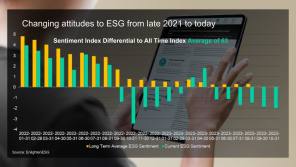
Article 2 / 4
Guide to client recruitment during the pandemicGetting ready for upcoming ESG requirements

As advisers get to grips with the impact of coronavirus on how they do business, there is another client-management challenge on the horizon for some.
MiFID II measures coming into force in H1 2021 will require advisers to assess client attitude to ESG investment and to have a system in place, for clients wishing to invest in sustainable products.
While these measures are due to start within the next few months, some advisers may not yet be sufficiently prepared for them.
Many advisers are already active in the ESG space and research commissioned by Rathbones, undertaken during November and December 2019, and published in August this year, indicated that advisers expect ESG to gain greater significance.
Every adviser who responded said they expected it to become even more important in the next five years and nearly all (80 per cent) viewed the new requirement as a positive step. A substantial amount of advisers (63 per cent) also acknowledged that client demand would motivate them to include ESG in the investment process.
Nevertheless, the research, which surveyed 100 UK advisers (half with 20 per cent or less of their book of business in ESG investments and half with 60 per cent or more), also revealed that not everyone has fully onboarded ESG advice within their company.
A little under a fifth of advisers (18 per cent) confirmed that ESG advice is already entirely integrated within their service. More than a quarter (28 per cent) reported that ESG advice was partly integrated and more than half (54 per cent) took the view that ESG is only relevant currently to some clients or parts of portfolios.
Adviser needs − clear communication and support – and less ‘noise’
Some advisers believe that that there is a need for better communication about ESG generally.
“We’ve been doing this sort of questioning for some time,” says Keith Churchouse, director at Chapters Financial, adding: “ESG is a very noisy sector at the moment. We’re getting about three emails a day about it from providers and compliance companies – although none from clients.
“And this noise created by the industry is not very helpful,” he reports. “It would be good to get clear messaging from governing bodies.”
The Rathbones research also highlights a need for support, for advisers. It found that just over a third of advisers surveyed (34 per cent) said that they needed more help with introducing ESG investing to their clients – and 61 per cent said they had concerns about their clients’ lack of knowledge. Furthermore, the research pointed to another area where advisers might benefit from support; more than four-fifths of those surveyed (83 per cent) raised the issue of matching client aims to a specific strategy as challenging.
Some support for advisers on the timeline for introduction of the requirement might also be useful, as Carl Lamb, compliance director at Smith & Pinching Group, suggests: “Journalists and the regulator can help by providing advisers with information on this change. People might need a gentle reminder that it is just around the corner.”
Research and information sources
In the meantime, there are a number of practical steps that advisers can take, to make sure that they are fully prepared for the forthcoming ESG requirement.
“Advisers should be considering how they are going to approach this subject with clients”, says Phil Smeaton, chief investment officer at Sanlam UK.
“It is no longer a peripheral topic and it should become part of ongoing discussions between the adviser and the client. Advisers will need to talk to their clients about ESG and explain what it involves, by giving examples to illustrate the issue.
"They then need to incorporate their clients’ ESG preferences into any product or service recommendation.
“In practice this means the first thing advisers need to do is research the ESG approach taken by products and services they are likely to recommend. Their research needs to include ESG as part of the due diligence in understanding the investment process, potential returns and risk profile.
“A great source of information should be the investment managers and fund houses themselves, who should be able to explain the extent that ESG influences their investment decisions and how this is embedded in the investment process.
“Before asking clients questions, advisers should explain how ESG considerations can affect investments from excluding perceived bad industries, to promoting companies taking positive action to support good companies.
"It is important that clients understand the choices they have available to them. It may be that an off-the-shelf product will satisfy a client’s ESG preferences, but some clients will appreciate a higher level of service and customisation available.
"As with active versus passive, the degree of ESG used is another consideration for investors. As ESG is still fairly embryonic in nature there is little correlation and agreement with what ESG involves, and passive implementations based on scoring systems may be difficult to explain and not produce the portfolio that investors expect.”
Mr Smeaton adds: “Aside from regulatory obligations, the wider topic of what is important to clients is a great way to demonstrate the value of a financial advice service − it is so much more than investing in a product.
“Great financial planners ask questions such as ‘why is money important to you?’ and stay quiet listening to what money means to a client.
"It isn’t always what we expect but it can quickly help the adviser understand their client. ESG is one important aspect in relation to the ‘why’ question and one that advisers should embrace as part of the value a financial-planning service can offer.”



